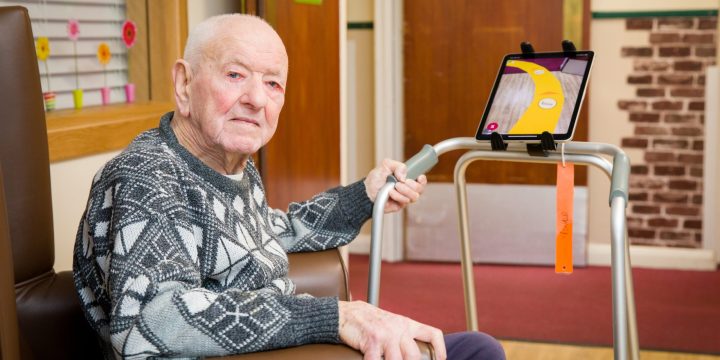
A.I. innovations to transform living with dementia are awarded £1.9m by Longitude Prize on Dementia
A.I. innovations to transform living with dementia are awarded £1.9m by Longitude Prize on Dementia
We are delighted to announce that an award for a total of £1.9m has been made to 24 pioneering teams of developers, researchers and innovators from across the globe. The Longitude Prize on Dementia, is being funded by our partner, Alzheimer’s Society and Innovate UK, and designed and delivered by Challenge Works. We are making a contribution to fund our support of the Prize for the ‘Paul and Nick Harvey Discovery Award’.
There are several key developments of the project to date, including:
- Innovations created by the 24 semi-finalists include an app that helps people living with dementia communicate, high-tech facial recognition glasses to identify familiar faces, and an augmented reality map to help people safely find their way around their area.
- Semi-finalists will each receive £80k grants as part of the overall £4m Longitude Prize on Dementia driving the co-creation of personalised technologies to help people living with dementia enjoy independent and fulfilled lives.
- The Longitude Prize on Dementia is funded by Alzheimer’s Society and Innovate UK and delivered by Challenge Works.
We can also report that Discovery Awards of £80k have been awarded to teams in the UK, USA, Canada, Australia, UAE, Colombia, Portugal and the Isle of Man to develop new technologies to improve the lives of people living with dementia. The teams will now work alongside people living with dementia and their carers to ensure technologies are intuitive, easy-to-use and able to adapt to their changing needs.
A few examples of key Innovations that have evolved from this project, include:
- An augmented reality map to prevent people getting lost or confused – The Dorothy Community from Care City (UK) is a digital “Yellow Brick Road” map that uses augmented reality to provide virtual directions, visualised pathways and simple instructions for people living with dementia to independently navigate their local community.
- High-tech specs for facial recognition – iMAGIC smart glasses are being developed by Khalifa University (UAE) to help people recognise familiar faces, provide reminders and alerts, zoom in and out to facilitate navigation, make phone calls to loved ones and monitor vital signs. The glasses will also eventually be able to help identify objects that sport a QR code (a type of barcode that can be scanned and interpreted by computer software).
As well as providing financial investment, the CareTech Foundation provides industry credibility and expertise. Discovery awardees in the UK will be offered co-creation sessions to further enhance the quality of technological innovations for people living with dementia and learning disabilities. CareTech Ltd, the leading social care provider for adults and children’s services in the UK, will also provide access to communities with additional cognitive needs to maximise the outcomes of the Prize.
To find out more about the Longitude Prize on Dementia and the 24 Discovery Award winners progressing to the semi-finals of the prize, please visit dementia.longitudeprize.org.
Funding Partners:
The Longitude Prize on Dementia is funded by the UK’s Alzheimer’s Society and Innovate UK and delivered by Challenge Works.
- Alzheimer’s Society is the UK’s leading dementia charity. It is a vital source of support and a powerful force for change for everyone affected by dementia.
- Innovate UK is the UK’s innovation agency, helping UK businesses to grow through the development and commercialisation of new products, processes and services, supported by an outstanding innovation ecosystem that is agile, inclusive and easy to navigate.
- One of the Discovery Awards awarded, the ‘Paul and Nick Harvey Discovery Award’ is sponsored by the Hunter Foundation, with further support coming from Heather Corrie and the CareTech Foundation.
- The prize has also received funding from the Medical Research Council. The MRC funds research at the forefront of science to prevent illness, develop therapies and improve human health.
- Challenge Works is a global authority on the design and delivery of challenge prizes to unlock technological solutions focused on social good.

“The shortlisted winners have successfully demonstrated that assisted-technology can play a critical role in ensuring that people living with dementia can live independent and fulfilled lives. Although there have been important recent medical breakthroughs in finding a cure for dementia, there is still some way to go. We are, therefore, delighted to be able to contribute towards this important initiative by which to harness technological innovations to enable those living with dementia and learning disabilities to live more independently.”

“It’s vital people with dementia are able to live independently, doing things that bring them fulfilment, for as long as possible. And that’s exactly what tech innovation can provide. “Today’s Discovery Award winners all have the capacity to develop cutting-edge tools that bring hope to the here and now, making a tangible difference to people’s lives. “New drugs have been discovered which slow the progression of early Alzheimer’s disease, but there’s still more to do. Alzheimer’s Society remains committed to innovative projects like the Longitude Prize so that together we can improve the lives of people living with dementia and their families.”

